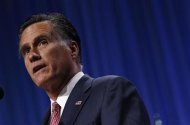Marking 9/11, Romney makes point of citing war in Afghanistanhttp://adf.ly/CkrPV
Marking 9/11, Romney makes point of citing war in Afghanistan
By Sam Youngman | Reuters – 20 mins agoRENO, Nevada (Reuters) - U.S. Republican presidential candidate Mitt Romney used the anniversary of the attacks of September 11, 2001, to do some repair work.
Still under fire from Democrats for not mentioning the war in Afghanistan during his nomination acceptance speech at the Republican convention on August 30, Romney spoke at length on Tuesday about the war during an address to the National Guard Association.
Romney said he was taking the day off from politics and focusing instead on remembering the nearly 3,000 people killed 11 years ago, while offering thanks to the emergency crews that responded to the attacks and service members who went to war afterward.
In a campaign that has been dominated by debate over the struggling economy, Romney discussed America's wars in Iraq and Afghanistan in the kind of detail he typically avoids.
"While the war in Iraq is over, nearly 70,000 American troops will still remain in Afghanistan at the end of the month," Romney said. "Our goal should be to complete the successful transition to Afghan security forces by the end of 2014."
Romney has long criticized Democratic President Barack Obama, his opponent in the November 6 election, for announcing a target date of 2014 for withdrawing from Afghanistan, where U.S. troops have been fighting the Taliban since about a month after the 9/11 attacks.
Romney has joined other Republicans in saying that Obama's setting of a date for the U.S. withdrawal has encouraged the Taliban and al Qaeda simply to wait out the American forces, then try to reclaim control of key parts of the country.
"We should evaluate the conditions on the ground and solicit the best advice of our military commanders," Romney said on Tuesday. "We can all agree that our men and women in the field deserve a clear mission; that they deserve the resources and the resolute leadership they need to complete that mission."
Despite the Romney campaign's pledge to refrain from politics on a solemn day, the Republican candidate appeared to take a shot at Obama over the issue of proposed defense cuts.
Romney has increasingly made the 2011 "sequestration" agreement between the White House and House Republicans as evidence that Obama wants to weaken the nation's military.
Under the agreement, supported in Congress by Romney's running mate, Paul Ryan, the Pentagon would be subject to about half the $109 billion in automatic spending cuts that would be triggered in January if the White House and Congress cannot agree on a plan to curb government spending.
"Of course, the return of our troops cannot and must not be used as an excuse to hollow out our military through devastating defense budget cuts," Romney said to applause.
PRAISING MILITARY, NOT OBAMA
After the speech, an adviser to Romney said the Republican was merely "reaffirming his principles" and not stepping back into campaign mode.
"With less than two months to go before Election Day, I would normally speak to a gathering like this about the differences between my and my opponent's plans for our military and for our national security," Romney said. "There is a time and a place for that, but this day is not that day."
Romney also recounted his own experience on September 11, 2001, recalling the carnage as he drove past the Pentagon.
In that day's attacks, passenger jets hijacked by al Qaeda operatives were flown into the Pentagon and the Twin Towers of the World Trade Center in New York. A fourth hijacked jet crashed near Shanksville, Pennsylvania, after passengers rebelled against the hijackers and stormed the cockpit.
Romney praised the U.S. military's killing of Osama bin Laden last year without mentioning Obama's role in approving the mission, and warned that the United States continued to face threats from militants.
"I wish I could say the world is less dangerous now, that it is less chaotic," Romney said. "But on September 10, 2001, we had no idea that America would be at war in Afghanistan."
(Editing by David Lindsey and Peter Cooney)

